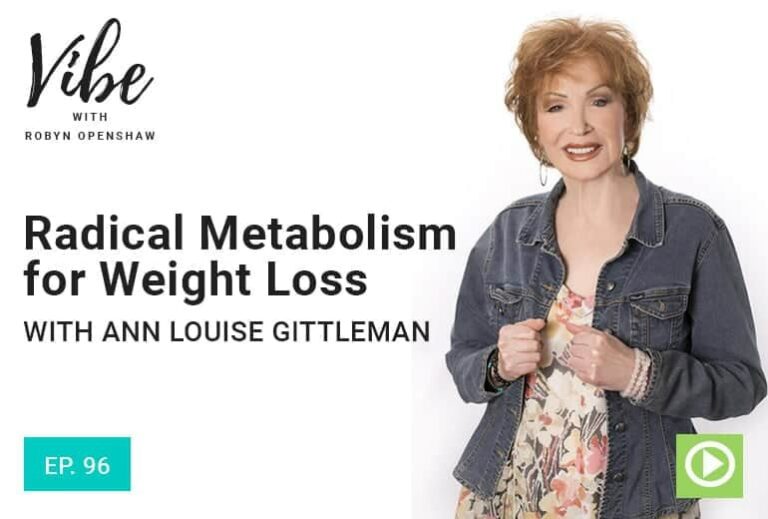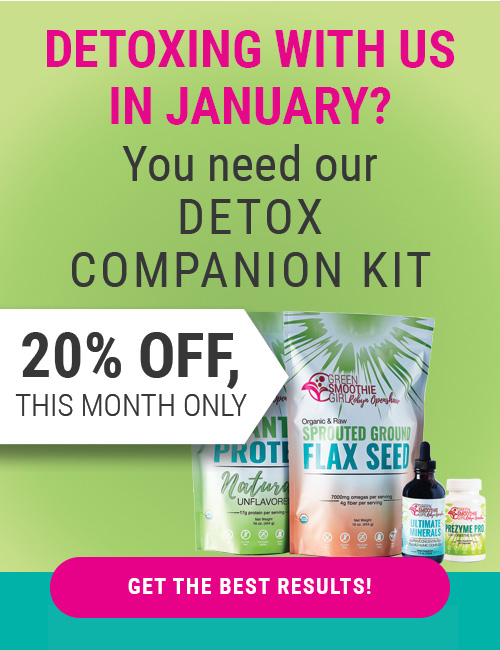Ep.96: Radical Metabolism for Weight Loss with Ann Louise Gittleman

Podcast: Play in new window
Today we are talking with Ann Louise Gittleman, PhD, CNS, the New York Times bestselling author of the newly released Radical Metabolism: A Powerful New Plan to Blast Fat and Reignite Your Energy in Just 21 Days. She’s been on the very forefront in nutrition for a long time. She’s written 30 books on diet, detoxification, the environment and women’s health. She’s a visionary and health pioneer in holistic and integrative medicine. She’s been recognized as one of the top 10 nutritionists in the country by Self Magazine. In this episode, you’re going to learn how to transform your health by focusing more attention on your diet and lifestyle. We also discuss the role of bitter herbs and foods in our diet.
LINKS AND RESOURCES:
Learn more from Ann Louise: Website
Connect with her on Facebook
TRANSCRIPT:
Robyn: Hello my friend and Welcome back to The VIBE show. Today we are talking about liver health and we’re talking about good fats versus bad fats and specifically we’re talking about metabolism and how to clean up your bile. Bile isn’t a very a talked about subject out there and I recently read a book by Ann Louise Gittleman who is really a pioneer out there who’s talking about things nobody else was.
She’s really been on the very forefront in nutrition for a long time, like decades. She’s written 30 books on diet, detoxification, the environment and women’s health. “The Fat Flush Plan” was a book I had of hers a long time ago. And we recently connected on Facebook and I had heard that she was coming out with a new book and I wanted to read it and introduce her and her content to you. She’s much loved out there as being a visionary, a health pioneer in holistic and integrative medicine.
She is a Columbia University graduate. She’s been recognized as one of the top 10 nutritionists in the country by “Self” magazine and received lots of other awards like that. And I do want to say that in reading her book, there were a few things that she talks about that I don’t think that the evidence points us to. For one, she’s a fan of whey protein, so she’ll recommend that in her book and I think that is a highly processed food and very problematic and not even particularly usable protein. She also advocates for more meat eating than I think the evidence recommends.
And what’s interesting because I’ve interviewed three people today on this day that I am recording these, and one of them was Dr David Friedman, I’ve very much enjoyed my interview with him as well. But I said, “You have a chapter on pork and you know, Americans love pork. And you kind of go through all these problems with it and they’re very, very serious problems. They start with the pig itself as an unclean food. And then at the end you say, yeah, go ahead and eat pork, but do it this way, and I’m curious, um, why you still say go ahead and eat pork?”
And I think that so many authors hold back from saying, “Just don’t eat it, this is bad for you”, because they don’t want to offend the population. People who are not plant based don’t want to hear that a plant based diet is better for them. And so I can’t speak for Ann Louise, can’t even speak for Dr Friedman, but I think it’s really interesting and it’s something to just put in your back pocket to think about, as you read news stories coming out constantly and you might read new books or hear opinions out there.
Sometimes I think we don’t tell the complete truth because we don’t want to offend people. We want to tell them what they want to hear. I once heard an expert say that the reason the USRDA is so low in vegetables, fruits, legumes, whole grains, and greens, is that they don’t want to hurt the American public’s feelings. They want them because they’re at such a low point to just reach a little bit higher rather than tell them what the actual standard should be.
And whether that’s true or not, I would like for us to have a high bar and really strive to find those recipes and find those ways to eat these foods that we know the healthiest populations of the earth eat and that we know that over 10,000 published studies lead us to the knowledge that these are disease preventive longevity, diet and really get a lot of them in our diet. And really the key to that is learning ways to use them.
And so I’ve been introducing you to a lot of authors these days whose recipes all by themselves, if all you do is use five of the recipes in those books, you’re winning. You know, we don’t actually need a ton of recipes in our arsenal for a whole foods diet to work. Most American families only make 10 main dishes and they’ve been recycling those for years and years and years and sometimes decades. And so getting five or ten new recipes in your arsenal that are delicious that your family likes and that are ways to eat whole foods, that’s the battle right there. And once you’ve got that, you’ve got it nailed. And being willing to cook too, just being willing to put a little bit of kitchen time in finding the easy recipes, that’s part of the battle too.
So the other thing I really don’t entirely agree with Ann Louise Gittleman on is that she believes Dr Steven Gundry’s theory that legumes are bad for us and that all legumes and grains should be stricken from the diet because they contain lectins. I do want to point out that virtually every whole food on the planet contains lectins and that every single one of the Blue Zones eats a significant amount of grains and legumes. Some of them eat mostly legumes. And so, while I don’t believe that that is good advice, I believe that 98 percent of what Ann Louise is saying in her book is really cutting edge, really helpful. You’ll get good recipes for it. But I do want to put those qualifiers out there. And I shared with her that I would put this little caveat in this introduction.
So as with most things, as with most of the people, that I interview, including Dr McDougall, he’s been around for 50 years and he’s very committed to the idea that a starchy diet is the best diet. He’s very much a plant based advocate. I don’t entirely agree with him that 90 percent of our food should be the starches like rice, beans, legumes, whole grains. I think that those are all part of a healthy diet. I think the evidence supports that, but I think that the non-starchy vegetables should make a bigger appearance. I think that there’s a lot of evidence that way. So these are minor quibbles over the doctrines and dogmas and findings of many of these clinicians and researchers whose work I think is really powerful.
And so I really am pleased to bring you the work of Ann Louise Gittleman because I think it’s very strong. Welcome Ann Louise Gittleman to The VIBE show.
Ann Gittleman: Hi Robyn. Lovely to be with you.
Robyn: Well, I’ve been following you on facebook or vice versa or whatever for quite a while now and I consider you to be one of the icons out there who’s been talking about issues in wellness and nutrition that others aren’t talking about. And you kind of discovered links before everybody else. And I remember coming out of the eighties, I’m old enough to have lived through the eighties low fat era. And you were the first one I remember who was saying, “Hey everyone, fats are important. This low fat era is not helping us. This is not a healthy diet”. Um, tell us a little bit about that book before we jump into the one that we’re really gonna dive deep into today.
Ann Gittleman: Well, yes, way back in the day, Robyn, and this was the 1980’s, I was the nutrition director for Nathan Pritikin, who was the harbinger of the no to low fat, high complex carbohydrate diet, and I saw firsthand some of the pros and the cons of being on a diet that eliminated all types of fat. So I then wrote my first book which was called “Beyond Pritikin”, which added back the fats, the right fats, the essential fats to the diet. As I found that certain seeds and nuts and even avocados in those days were very helpful in making people’s moods better and allowing them to lose weight, have better skin and better immunity. So it was diet heresy in those days quite frankly. And since then I’ve been creating diet heresy ever since.
Robyn: Well, and now we have people taking what was a good thing of fats are really good for us to let’s eat mostly fats and not eat any carbohydrates. How do you feel about that?
Ann Gittleman: I think it is going in the exact wrong direction because carbohydrates are just as important as fats. I feel the carbohydrates are part of a balanced diet, whether it’s your leafy greens, whether it’s a certain amount of legumes in the diet or even your starchy vegetables. But I’m definitely not a low to no carb individual.
Robyn: Well, I’m glad to hear a voice of reason for a nutritionist who’s been out there for a really long time. I’ve been reading your book, which we’re talking about today. It’s called “Radical Metabolism: A Powerful New Plan to Blast Fat and Reignite your Energy in just 21 days”. And I was fascinated by it. I learned a lot of things in it. And some of the things that you’re talking about, I think again, you’re going to be the one starting a trend to talking about, for instance, bile.
And I was telling you before we recorded, that in the GreenSmoothieGirl Detox, we do some protocols at the end to really increase the quality and quantity of bile and flush the calcifications, the crystalline structures, the stones from thousands of bile ducts in the gallbladder and the liver. And I think you were early on talking about that because I think your bestselling book to this point is “The Fat Flush Plan”, which feel free to talk about that, but I want you to talk a little bit about bile. Why does it matter? And why is this, as you said, sort of unsexy topic, really, really important for people to learn about?
Ann Gittleman: Well, I think it’s just as important as probiotics Robyn. And we were talking offline a little bit about the importance of bile and making it sexy once again. So maybe between the two of us we’ll make this a very sexy topic. I think we all need free flowing bile in our bodies because it helps to break down fats, number one. Number two, it helps to flush toxins. It’s actually a form of liver detox. And number three, which is not as well known, but what I mentioned in radical metabolism, it helps to rev thyroid function so we can all slim down without struggling as much as we are.
So it’s a very important aspect to bring back into our awareness, which is the reason that I created “Radical Metabolism” in the first place. I want you to eat the foods that will enable your body to make proper bile and if you don’t have a gallbladder, I’d like us to eat even more of those foods so that sluggish bile will not be a problem in terms of slowing down to your thyroid.
Robyn: So talk about how much bile a healthy person produces and what kind of quality it is. And what the average person out there eating the standard American diet is actually getting from their bile production. And what kind of functions it has in the body.
Ann Gittleman: Well, we’re producing, if we’re healthy, at least a quart of this very greenish little liquid. It’s kind of like liquid gold that is stored in the gallbladder. And what we’re hoping to have is very free flowing bile, which is not sludging up so that you’re making these crystalline structures. You want free flowing bile, which is thin, which is flowing properly. It’s not getting stuck in the bile ducts and that’s why it’s so important to be eating certain foods that will actually thin your bile. It’s one of the reasons that in all of my programs, Robyn, I talk about the importance of fresh lemon juice in the morning because it actually thins the bile. As well as foods like dandelion root tea, which is a wonderful bile thinner.
So in my book it’s very important to thin the bile so it is not affecting any other digestive function. And I think it’s important to also make sure that if you do not have a gallbladder that you are supplementing properly with the proper kinds of bitters or certain types of bile salts or foods so that when you’re eating fatty foods, you’re digesting them, number one, and you’re getting all of the benefit from the fat soluble vitamins.
What concerns me greatly in this day and age is that a lot of us are not, while we’re eating the right kinds of fats, hopefully if people read “Radical Metabolism”, but we’re not breaking them down properly, so there’s a deficiency of Vitamin A, Vitamin D, Vitamin E and Vitamin K. And I feel that this is exceedingly important so that if we’re going to be eating properly, all of those fat soluble vitamins will be in circulation, and our immunity will be improved.
Robyn: So you’ve written a previous New York Times Bestseller and it’s still selling like crazy. Why did you focus on this topic? Why did you choose to write this book?
Ann Gittleman: Because I felt that there are a lot of people out there, and dare I say that are on the Keto plan that are on the Paleo plan, they’re eating all of these very toxic fats, they may be losing weight but they’re becoming sicker. So I felt it was time to get out there with a diet that talks about the right kind of fats so that individuals would learn the difference between a saturated fat, the difference between an essential fatty acid and what that does to the mitochondria as well as the cell membrane. So because I’ve been leading the pack so to speak, on getting fat back in the Diet, it was time to really change the dietary landscape. I’m very concerned about people that are on these all fat diets. Robyn.
Robyn: Yeah. I’m really concerned about it too. And the way we connected is kind of funny. You probably don’t know this, but I saw that you had shared a post I did on my personal page, um, that was just some facts about the ketogenic diet that deeply concerns me. And you shared it and I was like, “Hey, I know her. She’s like the grandma of nutrition.”
Ann Gittleman: Probably that’s true.
Robyn: And so I had my assistant reach out to you to ask you to be on the podcast. I think at the same time I had heard that you were coming out with a new book. So what’s different about this book?
Ann Gittleman: What’s different is we really focus on certain fats, number one, the omega 6 fatty acids rather than the Omega 3’s, which I have found to be very underplayed and under recognized, very important for the structural membrane of the cell, very important for the mitochondria. And also bile’s impact, we’re getting back to bile, beautiful bile. Bile’s impact on the thyroid, for me, is a real concern, since I’d say 8 out of 10 women over a certain age, to me suffer from insufficient or poor quality bile. And I’m finding that as we age, everyday toxins are building up in the bile or they’re building up in the body and then they’re becoming entrapped in bile which makes this fluid, this wonderful liquid gold, very thick and unable to flow freely.
And what complicates matters is that there’s a lot of excess estrogen out there from contraceptives to food additives, which is raising cholesterol levels in the bile and it’s making the digestive fluid even thicker and more prone to becoming congested. So I’m concerned about thick gunky bile. I’m concerned about the fact that women have so many hormone problems that they’re not losing weight the way they think they should and that we’re not detoxing properly because nobody has recognized the importance of bile in the detox function. So I’m here to bring bile back.
Robyn: Ha, I love it. So you were talking about the importance of Omega 6’s, which is really interesting because I feel like the last 20 years we’ve been telling people, Hey, conventionally raised eggs, have way too much Omega 6 and not enough Omega 3. And we’ve been really focused on helping people get more and better quality sources of Omega 3’s because the ratio was off.
And probably because we have so much fried food in the standard American diet and vegetable oil is really, really predominant in Omega 6. And you’re probably going to want to say something about what you think the quality is of vegetable oil. But talk a little bit about that because I think you’re out there sounding the alarm about, hey, let’s don’t neglect Omega 6, when we’ve been freaking out about getting too much of it for a long time.
Ann Gittleman: Well, I’m concerned because the ratio based on all the research that I’ve done over these decades, and as you say, I’m kind of the grandmother here of all of this, seems to point to a ratio of 4:1 in favor of Omega 6’s. Now, not all Omega 6’s are created equal. So we’re not talking about the commercially processed chemicalized oils that are out there, the freaky fats that are from, uh, your soybean oil or from your corn oil or sunflower seed oil. We’re talking about the basic linoleic acid that you find in sources like hemp seed oil, that you’re finding in sesame seed oil, in a unaltered safflower seed oil.
And we’re talking about them because it’s so important for the maintenance of the cell membrane structure. It enhances the permeability of the membranes. It’s also important for the prevention of toxins from entering the cell. And it’s important because it is the preferred fuel for the mitochondria, which are those little energy machines and energetic engines that are in every cell of the body. So I say bring back the Omega 6’s. If you’ve got a concern about eczema or psoriasis or these funny skin rashes, then most likely you’re deficient in Omega 6. And when I run my tests with my people and do DNA testing, which I do with many of my private patients, we’re finding a dramatic deficiency in the Omega 6 linoleic acid which used to be mentioned in all the nutrition books way back in the sixties.
Robyn: Very interesting. Well, earlier I interviewed Dr John Mcdougall and you might be aware since you’ve been around for a long time and so has he. He just hates oils and he says, “the fat you eat is the fat you wear”. And he says “the body doesn’t have use for refined oils. And when you take the food itself out of the oil, you’ve lost a lot of the beneficial properties” He’s kind of anti-oil. And so, uh, what evidence do you have that you could share with us about, what we should use oils for? Which kinds? You introduced me in the book to a few types of oils I’ve never used that I thought I would experiment with a little bit. But talk about your take on oils that’s different than that.
Ann Gittleman: Well, it’s diametrically opposed. God bless him. I know John Mcdougal because John Mcdougal was almost a contemporary of Dr Nathan Pritikin who actually wasn’t a doctor but should have been. So I’m a believer that the right kind of oils are very important. And that there are skinny fats and there are fattening fats. And we’re talking about essential fatty acids that are totally essential for the cell on a minute by minute, second by second basis. It’s the precursor of the Prostaglandins that won the Nobel Prize way back in the eighties.
So I’m talking specifically about these Omega 6’s that are found natively in nuts and seeds. They’re found in safflower oil and sesame seeds and hemp seed oil, which is one of the centerpieces of my new program. Which is not only a high source of linoleic acid, but of GLA, so very important in terms of sending off your brown fat into the stratosphere so that you can actually lose weight without doing very much of anything but simply consuming the oil.
So I would say that certain of these oils including one called pine nut oil, very, very healing for the gut for those that have problems with GERD or stiff joints in the morning or any kind of skin issues. And again, what I’ll say is when you’re thinking of skin, think of Omega 6’s. And a lot of the research that we talk about is from Patricia Cain and her husband, Dr Edward Cain. We talk about the research that has been done for years, decades now, on the importance of, evening primrose oil, borage oil as well as black current seed oil.
So my sense is that if you do any testing, as so many of us do in the functional integrative medicine world, and you test all of your Omegas, you’ll find that many people have gotten on the Omega 3 bandwagon, whether they’re using flax or whether they’re using the superseeds now or even Campanula oil. But what we’re still deficient in is the good Omega 6’s. And that’s where you look for the good Omega 6’s in your wonderful oils like the hemp seed oil that I talk about. And Pine Nut oil which can heal the digestive tract from your mouth to your butt. So I’m telling you, these oils have a lot of claim to fame and you just need a small, small amount Robyn, to have a major difference in your immunity as well as your skin and your weight loss efforts.
Robyn: Moving onto another subject in your book that I thought was very interesting cause I was reading your book when I was in Switzerland. And I take my followers every summer to a clinic in Switzerland where they do biological medicine, the European counterpart of functional medicine. And the MDs there put all of the people I bring through a liver detox protocol. And like 15 to 30 minutes before each meal they have you put a tincture of bitters into your water and drink it to stimulate bile production. And so I happened to be doing that while I was reading about how important bitters are. Will you talk about that? Because it’s one of the major things that you recommend in your sort of metabolism reboot and helping people get their bile healthier.
Ann Gittleman: Bitters are better. So if we can all remember that, that’ll be the new mantra as we go forth into 2018. Bitters are better. It stimulates the release of bile as you so rightly suggests and as your Switzerland Clinic knows. Very important for the production of pepsin and pancreatic enzymes. And bitters also increase the tone of one of your important digestive sphincters. So the reality is, that in our day and time, we’ve lost our tastes for bitters. You know, it used to be part of the dinner table where you may have something like horseradish or some kind of bitter green to stimulate the appetite, but most of us in this day and time don’t recognize the importance of bitters. Nor do we take them on a regular basis.
So whether you’re plant based or whether you’re eating those four legged creatures, we can all benefit from a little bit more of the bitters in our breakfast, lunch and dinner and snacks. I have whole lists of the bitter foods that I think everybody should be looking at on their dinner plate, whether it’s from vegetables and fruits, herbs and spices, as well as do it yourself bitters that you can take on a daily basis. I love the herbal bitters by the way, from dandelion and fennel and gentian root and ginger. It’s a whole different world of digestion, assimilation and exceedingly important for those that do not have a gallbladder. So my book, not only are we bringing bile back, but we’re bringing bitters back because bitters are truly better.
Robyn: Okay. And one thing that we were curious about, and I could not provide an answer to our detoxers in the Swiss Alps was, you know, they were supposed to drink apple juice for the malic acid to break down stones before they did the oil flush at the end. And they were taking that apple juice that they were supposed to be drinking every day, and they were pouring it into their bitter tea that they’re supposed to drink all day.
And I said, well, I’m going to be interviewing Ann Louise Gittleman and she is talking a lot in this book that I’m reading about bitters. I’m going to ask her if you can do that because I don’t know if the bile stimulation starts with the taste of it with your salivary glands in your mouth or can we mix the two together. And think chocolate because I was glad to see that you mentioned dark chocolate as being a bitter because everyone will be excited about that who likes chocolate. Which is, you know, most people. But you know, most people, the form of chocolate they’re eating, it doesn’t actually taste bitter. So does it have to taste bitter for it to have the desired effect in the digestive system?
Robyn: Yes. It has to taste bitter. There are actually bitter receptors on the back of the tongue. So combining the apple juice with the bitters is not the best of ideas.
Robyn: Okay. So when we get chocolate that yeah, there’s some dark chocolate in it, but lots of sugar and you know, whatever is in it, you know, you can get anything from a snickers bar to a really high quality, 70 percent cacao, you know, fair trade, organic chocolate, that’s not necessarily going to get it.
By the way, one of our attendees at the Swiss clinic was a medical doctor who she had bought 100 percent cacao and I was amazed. I don’t think I’ve ever had a hundred percent cacao, so there’s no sugar in it. There was like no extra fats in it to make it creamy. And I was amazed it was delicious. We put it under our tongue and let it melt under our tongue. So just a little tip for everyone that chocolate can be one of your bitters, it can melt under your tongue. Ann Louise also recommends having a little bit of like arugula, there’s lots of different bitter greens. Turnip Greens, mustard greens, so that was really fun information.
Ann Gittleman: It’s very good information and it’s good for everybody whatever your dietary predilection. But the other thing that I mention in the book is the importance of a particular bitter, which is watercress. We make a watercress soup in our four day cleanse. Which is not only a bitter that we’re making not enough use out of it in this day and age, but it’s also important as a cancer fighter and a detoxification agent. So you’re right about those bitter greens. I love the bitter greens, like the endive and the dandelion, the radicchio, arugula and also grapefruit.
You know, it’s really interesting to me to note that many years ago people were on the grapefruit diet and one of the reasons that grapefruit is so important in terms of helping to lose weight is because it contains a fido chemical that’s actually a bitter. So you’ll find bitter fruits as well as bitter vegetables and leafy greens and herbs and spices. It’s a wonderful new taste environment that we have yet to explore. And it’s one of the reasons that I think some of our recipes are going to be favorites, at least I hope so, with people that don’t have good digestion, detoxification or issues with their hormones.
Robyn: Yeah. That was really interesting to me. I’m interested in more of the myths that you could explore with our readers here about what is commonly believed out there that you kind of bust these myths in the book.
Ann Gittleman: Well, one of them of course is that Omega 6’s are always bad and you need just Omega 3’s in the diet. That’s one of them. And then the other one that we’ve kind of touched upon, you and I, Robyn, is the situation of the gallbladder. That the gallbladder is indeed a throwaway organ. And it is not. You’re losing your timing of bile if you don’t have a gallbladder. So you’ve got to make substitutions according to what I tell you to do with the bitters in the book.
A third that I’ll reveal is the importance of cooking utensils. I believe it’s just as important to know what you’re cooking in as to what you’re cooking. And that’s where we throw away the myth of how important it is to use cast iron. That’s one of the myths that we throw out the window because cast iron has a certain type of iron that can actually accumulate in the system.
And it’s one of the reasons that I’m now looking at plant based diets much more seriously because people that are the longest lived have lower levels of stored iron in their body and those that eat a lot of meat are stockpiling iron like crazy. And I’m just wondering if this onslaught that we’re seeing of degenerative diseases from Alzheimer’s to cancer to all kinds of auto immune illnesses may not just be the result of exceedingly high levels of iron that are coming from all the meat based diets that are so important in the forefront today.
Robyn: Okay. So tell us what’s for breakfast on the radical metabolism plan.
Ann Gittleman: We’ve got a blaster. We blast your energy with an energy blaster and that is a drink that we make with a bitter. And one of the bitters that we use is a particular kind of coffee that I did a lot of research with. This coffee is a bitter. So it’s an organic mold, free coffee, the highest in antioxidants in the world from what I understand. And that serves as the basis for the coffee. You can use a protein powder of your choice with that, a little bit of coconut milk, maybe a little bit of Stevia for sweetening and Voila, you’ve got our drink in the morning. And I also include some citrus in there. We call it our citrus blaster and that is that we’re taking the peels of organic, sometimes it can be lemons, organic tangerines, organic oranges, and we’re drying them to get all of the bioflavonoids and bitters in your drink. So it’s a better bitter citrus blaster first thing in the morning.
Robyn: Yeah. I was reading about your coffee plus carnitine and colleen formula. And you cite some research about how it’s just super crazy for weight loss. So tell us a little bit about that because I had not heard that one before. And I think a lot of my audience would be super excited to learn a little hack for weight loss. Because coffee is, you know, you can find people who are saying it’s terrible for you, it’s really acidic. You can find lots and lots of published evidence that doesn’t seem to have vested interest behind the paying for the study that says, no, actually coffee has quite a few benefits. So if you’re a coffee drinker adding amino acids, carnitine and colleen to it, tell us about that.
Ann Gittleman: I think it’s very important to understand. I was never a coffee drinker until I did research about the importance of bitters and learned that coffee has been shown to reduce levels of triglycerides by nearly 60 percent. It slashes the risk of type two diabetes by over 50 percent and also heart disease by 50 percent. But what was really interesting to me for my book literally and figuratively, is that there is some real cutting edge science which has shown that there’s a particular compound in coffee that increases fat burn by up to 50 percent. It was a study in the British Journal of Nutrition.
And there’s a particular antioxidant in coffee which is chlorogenic acid, that’s especially beneficial for weight loss. And not only that, but if you get coffee that’s grown in very high altitudes with extreme temperatures, maybe beans from Columbia or Mexico, you get 10 times more chlorogenic acids than the standard “Cup of Joe” that you get on the street.
So I’m excited about it. Coffee is also a source of these polyphenols that’s highly deficient in the diet. The company that I talk about in the book is now coming out with a decaf coffee. So I think there’s something to be said for coffee. And you know, if you don’t like it taken in one way, you can always use it as a coffee enema as far as I’m concerned.
Robyn: Yes. My audience, many of them are very familiar with the coffee enema. And in fact I’m doing our detox with my boyfriend right now and he just came over here and did his first coffee enema today. Very proud of him. Now I’m talking my 20 year old daughter into doing it. And so you know, then you’re not getting the acids through the GI tract and you’re just getting the benefits to your liver and your gallbladder.
Ann Gittleman: Oh, it’s a lifesaver. But this is the best coffee to use because it’s mold free, high in antioxidants and it’s not as acidic. It’s actually got a very mild flavor.
Robyn: Well, that little tip is a sidebar everyone, on page 138 and 139 of Ann’s new book, “Radical Metabolism”, which by the way is just barely coming out, so we’ll see, maybe she’ll get another New York Times Bestseller out of this. They know they like people on the New York Times list who’ve been there before. So I’m rooting for you.
Ann Gittleman: Well thank you so much. That’s so kind of you.
Robyn: So where can folks get the book and where can they connect with you for a deeper dive into everything you have to teach?
Ann Gittleman: Well, let’s connect at radicalmetabolism.com because if anybody orders or pre-orders the book, whenever they hear your wonderful podcast, they’ll get some free gifts that talks about crushing cravings as well as the importance of all the new coffee research and they’ll also get 25 recipes. As well as a 30 percent off coupon for this particular type of coffee that I think is so wonderful.
Robyn: Fantastic. Well, thank you so much for the great work that you’re doing in the world. I get a very strong sense in your book that you care a lot about the health and wellness of those who follow you. And it’s really conversational, an easy read, I was very drawn into it. And actually finished the book. It’s a very, very substantive book. So thank you for the work that you’re doing. And thank you so much for being on The VIBE show today.
Ann Gittleman: My pleasure. And thank you for your wonderful work. Just continue fighting the good fight Robyn.














No comments found, but you can be our first!